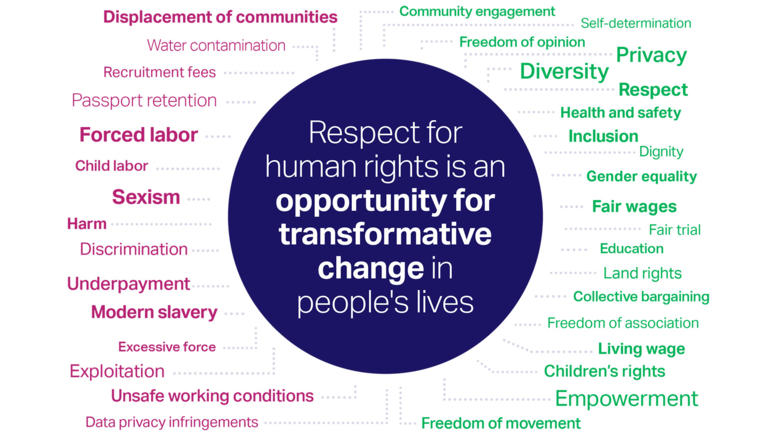Something strange has been happening in the world of business and human rights. Leaders of multinational corporations around the globe are speaking out about the negative human rights challenges faced in their operations and supply chains. Where most companies seek to avoid any public association with human rights issues, these business leaders are breaking the mould – and they want others to do the same.
Here at WBCSD, we spoke to our member companies to get behind this trend. We found a growing number of senior executives who are increasingly aware of the foundational business responsibility to respect human rights – and of their role in raising the bar for their companies, industries and supply chains. But beyond this, they are sharing an inspiring message with their peers and partners: that they have the collective power to drive transformative change in people’s lives, especially those of the most vulnerable.
Taking action to tackle systemic human rights issues is becoming accepted as one of the most powerful opportunities companies have to lift people out of poverty
To support this movement, WBCSD has launched a Call to Action for Business Leadership on Human Rights. Throughout November, in the run-up to the United Nations Forum on Business and Human Rights, we are releasing a daily video series to bring this message to life.
The series includes business leaders from across the globe sharing their personal perspectives and company positions on human rights. They speak about human rights challenges they are tackling in their operations and supply chains – related to forced and bonded labour, child labour, data security, recruitment fees, gender equality, access to water and sanitation, workers voice, collective bargaining, community engagement and more – and they extend a call to action to their peers and partners. All with the aim of inspiring and mobilising business leadership for human rights.
The UN Guiding Principles on Business and Human Rights (UNGPs), launched in 2011, clearly lay out the business responsibility to respect human rights, and have catalysed a significant expansion of the business and human rights landscape.
Governments around the world are working on National Action Plans to implement the UNGPs and are increasingly adopting the principles into national law. Indexes, databases and benchmarks are being developed that track the performance of companies and industries. This information is being used by investors to inform decisions on capital allocation and cost. It is also making its way into mainstream media, sparking higher levels of public interest in business performance. At the same time, support for companies is more available than ever. The UNGPs are being translated into detailed tools and guidance for business, joint action platforms are emerging to tackle issues in specific industries and geographies, and large companies are sharing their expectations and expertise with partners and co-contractors along their supply chains.
This wave of information, activity and expectations is pushing corporate action on human rights beyond minimum standards, risk-management and compliance, and into companies’ strategies, purpose and goals. As business awareness rises, taking action to tackle systemic human rights issues in workplaces and value chains is becoming accepted as one of the most powerful opportunities companies have to lift people out of poverty, discrimination and abuse, and transform the lives of the world’s most vulnerable people.
It requires that we have the courage of our convictions. And that we need to clearly communicate the company’s commitment to human rights
The momentum behind the Sustainable Development Goals (SDGs) has added fuel to this positive movement. It has helped businesses to realise that, by contributing to the achievement of human rights for all, they can play a pivotal role in building the peaceful and inclusive societies envisioned by the Global Goals.
So what can business leaders do?
In the WBCSD CEO Guide to Human Rights, we have outlined four actions that business leaders can take to influence their organisations, their supply chains and beyond:
KNOW the most important human rights for your company. This means understanding the risks posed to people involved in and affected by the company’s products, services, operations and supply chains. It means keeping track of emerging hot topics and being prepared to communicate on challenges faced and the company’s efforts to continuously improve.
In the words of Andrea Alvares, chief marketing, innovation and sustainability officer at Natura: “This is what we need to bear in mind as we run our businesses: to be attentive, to rethink how we do business, to know our chains, to lead courageous changes and to engage our internal and external network in bringing about this transformation.
LEAD from the top. This means sending a clear message to staff across the organisation, empowering them to set clear expectations in their dealings with business partners, and provide the objectives, incentives and resources staff need to address human rights issues effectively and discuss them openly.
As noted by Brad Smith, president of Microsoft: “It requires that we have the courage of our convictions. And in addition, that we need to clearly communicate the company’s commitment to human rights to ensure that our employees appreciate that commitment and that we empower them to stand up for strong ethics and the protection of human rights”.
ENGAGE transparently with stakeholders. This involves listening directly to the people a business can impact to understand their perspective and inform the course of action taken. It requires sharing your human rights message with suppliers, partners, customers, investors, industry peers and governments.
According to Bertrand Camus, CEO of Suez: “To meet the challenges of human rights, leaders have to engage personally and instil a collective dynamic, both in their companies and in their markets. At company level, it translates into constant contact with the field, listening and paying attention to all, and especially to the most vulnerable.”
COLLABORATE beyond your comfort zone. This involves engaging widely with the broad range of stakeholders involved to tackle endemic and systemic human rights issues. It requires working with others in your industry to build leverage, change incentives and raise the bar. Most importantly, it means going beyond business as usual in order to develop the unique dialogues and collaborations needed to address the root causes of complex issues.
As Alan Jope, CEO of Unilever, reminds his peers: “As CEOs we have a duty to ensure that fundamental rights and freedoms are respected and upheld, not only within our businesses but throughout our value chain. There’s much that our organisations can achieve individually, but there’s even greater value when we come together through partnerships and collaborations. Ultimately, we all have the same goal: to create a fairer and more inclusive world.”
So far, WBCSD's Call to Action has been endorsed by senior executives of 35 member companies with more than 2.8m employees and vast global supply chains
Our Call to Action for Business Leadership on Human Rights builds on the concrete recommendations outlined in the CEO Guide to Human Rights, but is brought to life by the voices and examples of the forward thinking business leaders who are supporting the call.
So far, it has been endorsed by senior executives of 35 WBCSD member companies. Their collective actions have significant reach – they represent diverse companies headquartered in 17 countries, with more than 2.8 million direct employees and vast global supply chains. In addition, through WBCSD’s Global Network partners, more than 70 business leaders have signed local calls to action to peers in their own nations and regions – in Croatian, French, Japanese, Portuguese, Spanish and Ukrainian, with more on the way.
We hope these diverse voices inspire more business leaders around the world to take action in support of human rights, and invite you to share their messages and join us in mobilising business leadership for human rights.
This was originally published on: http://www.ethicalcorp.com/









